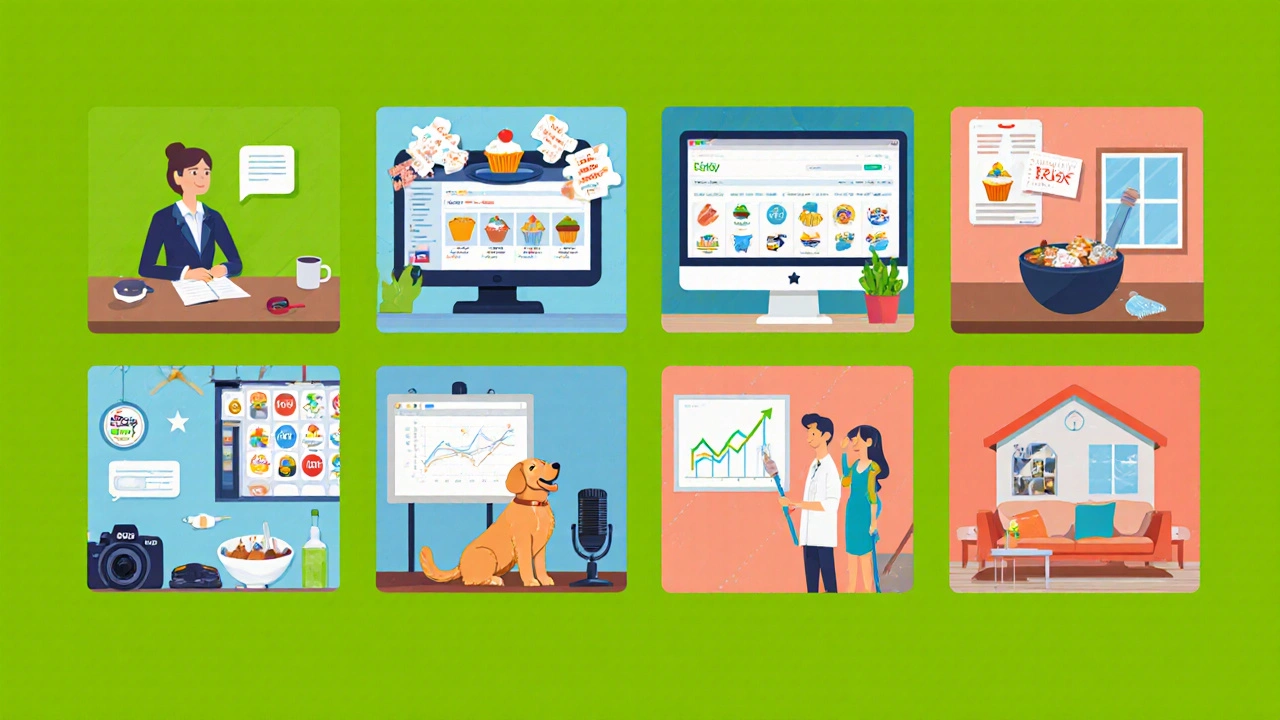Business Startup Cost Calculator
Select your business type to see estimated startup costs, legal complexity, required skills, and potential earnings. This tool helps you compare options and make an informed decision.
Select Your Business Idea
Your Results
Based on your selection, your business meets the criteria for easy startup with minimal investment and quick revenue generation.
Quick Takeaways
- Look for low upfront capital, minimal licensing, and skills you already have.
- Online‑focused ideas often need the least paperwork.
- Typical startup costs range from $0 to $2,000.
- Choose a model that lets you test the market before committing big money.
- Follow a short 5‑step launch checklist to get moving fast.
What Makes a Business Easy to Open?
When people ask for the easiest business to open, they’re usually after three things: low startup cost, simple registration, and a skill set that’s already theirs. In practice, the easiest ventures share these traits:
- Minimal legal hurdles - a sole‑proprietorship or a one‑person LLC that can be filed online in under an hour.
- Low fixed overhead - no lease, no inventory, or just a few hundred dollars for basic supplies.
- Immediate cash flow - you can start earning as soon as you land the first client or sale.
- Scalable skill - the work can be done part‑time, then expanded with freelancers or automation.
If a business checks at least three of these boxes, it’s a strong contender for “easiest”.

Top 8 Easiest Businesses to Open
Below are eight ideas that meet the criteria above. Each one is broken down into what you need, how to register, and the first actions to take.
Sole Proprietorship Consulting is a service‑based business where you sell advice in a field you already master, such as marketing, finance, or HR. You only need a simple tax registration and a professional email address.
- Typical cost: $0‑$100 (business name and basic website)
- Key steps: register your DBA, set up a simple invoicing tool, market to your network.
Dropshipping Store is an e‑commerce model where you sell products without holding inventory; a supplier ships directly to the buyer.
- Typical cost: $100‑$300 (store platform, domain, marketing ads)
- Key steps: choose a niche, sign up with a reliable supplier, build a Shopify or WooCommerce site, run test ads.
Home‑Based Bakery is a small‑scale food business where you bake goods in your kitchen and sell to local customers or via online marketplaces.
- Typical cost: $200‑$800 (baking supplies, permits, packaging)
- Key steps: obtain a cottage‑food license, create a simple menu, list products on Etsy or a local delivery app.
Freelance Graphic Design is a creative service where you design logos, social media assets, or brochures for clients on a per‑project basis.
- Typical cost: $0‑$150 (design software, portfolio website)
- Key steps: set up a Behance/Dribbble portfolio, join platforms like Upwork or Fiverr, pitch directly to small businesses.
Digital Course Creation is the process of packaging your expertise into video lessons and selling access through platforms like Teachable or Udemy.
- Typical cost: $100‑$500 (camera, microphone, course platform fees)
- Key steps: outline the curriculum, record modules, upload to a platform, run a launch email sequence.
Pet Sitting Service is a local, home‑based service where you care for pets while owners are away, often booked through Rover or local ads.
- Typical cost: $0‑$50 (insurance, basic supplies)
- Key steps: create a simple website, register on pet‑sitting platforms, gather references from friends.
Affiliate Marketing Blog is a content site that earns commissions by promoting other companies’ products through unique referral links.
- Typical cost: $50‑$200 (domain, hosting, SEO tools)
- Key steps: pick a niche, write product‑review articles, sign up for Amazon Associates or niche affiliate programs.
Local Cleaning Service is a business offering residential or office cleaning, usually requiring only basic equipment and a reliable schedule.
- Typical cost: $150‑$600 (cleaning supplies, transportation, insurance)
- Key steps: register a DBA, create flyers or Simple Google Business profile, get the first client through word‑of‑mouth.
Side‑by‑Side Comparison
| Business | Startup Cost (USD) | Legal Complexity | Skill Required | First‑Month Earnings Potential |
|---|---|---|---|---|
| Sole Proprietorship Consulting | $0‑$100 | Very Low | High (expertise) | $500‑$2,000 |
| Dropshipping Store | $100‑$300 | Low | Medium (marketing) | $200‑$1,500 |
| Home‑Based Bakery | $200‑$800 | Medium (food permits) | Medium (baking) | $300‑$1,200 |
| Freelance Graphic Design | $0‑$150 | Very Low | High (design) | $400‑$2,500 |
| Digital Course Creation | $100‑$500 | Low | High (teaching) | $300‑$3,000 |
| Pet Sitting Service | $0‑$50 | Very Low | Medium (care) | $200‑$800 |
| Affiliate Marketing Blog | $50‑$200 | Very Low | Medium (content) | $100‑$1,000 |
| Local Cleaning Service | $150‑$600 | Low | Low (physical) | $300‑$1,500 |
5‑Step Launch Checklist (Works for All Ideas)
- Pick a name and check domain availability. Use a .com or local TLD for credibility.
- Register the business. In most regions a DBA or single‑member LLC can be filed online in under an hour.
- Set up a basic online presence. A one‑page website, Google Business profile, and a professional email are enough to start.
- Gather essential tools. List the minimal equipment you need - a laptop, a phone, a few kitchen utensils, or cleaning supplies.
- Get the first client. Reach out to friends, post on local groups, or launch a low‑budget ad campaign; aim for a single sale within the first week.

Common Pitfalls & Pro Tips
Pitfall 1: Over‑investing before validation. Many newbies buy expensive inventory or software before testing demand. Start with a $10‑$20 ad, see if people bite, then scale.
Pitfall 2: Ignoring local regulations. Even low‑cost businesses may need a food permit or liability insurance. Check your city’s business portal early.
Pro Tip: Leverage existing platforms. Services like Etsy, Upwork, Rover, or Amazon Associates give you instant credibility and traction without building everything from scratch.
Pro Tip: Automate repetitive tasks. Use free tools like Calendly for booking, Wave for invoicing, and Zapier for simple workflows. Automation frees up time for revenue‑generating work.
Frequently Asked Questions
Do I need a business license for a home‑based bakery?
Most states require a cottage‑food or home‑based food license. The process usually involves a kitchen inspection, a food‑handler course, and a modest fee ($50‑$200). Check your local health department for exact steps.
Can I start a dropshipping store without a credit card?
Yes. Many platforms accept PayPal or debit cards for the initial setup. However, a credit card often unlocks higher ad spend limits, so consider adding one once you have a few sales.
How much time should I allocate to a freelance graphic design side hustle?
Start with 5‑10 hours per week. Focus on short‑turnaround projects (logos, social posts). As you build a portfolio and repeat clients, you can increase to 20‑30 hours and raise rates accordingly.
Is affiliate marketing really a passive income source?
Initially it’s active - you must write content and promote links. Once you have evergreen posts ranking in Google, those pages can generate clicks and commissions with little ongoing effort.
What insurance should a local cleaning service carry?
General liability insurance (around $300‑$500 annually) protects you if you damage a client’s property or cause an injury. Some insurers also offer bonding for added trust.
Next Steps
Pick the idea that aligns with your current skills and budget, run through the 5‑step checklist, and secure your first client within a week. If you hit a roadblock, revisit the FAQs or the comparison table to see which alternative might fit better. Remember, the hardest part is often just starting - the rest follows with consistency.

